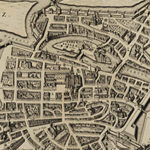Emancipation and the Jews of Metz, France
by David P. Rosenberg, M.P.A., Reference Services Research Coordinator, Center for Jewish History
“The means of making the Jews happy and useful? This is it: stop making them unhappy and useless. Give them, or rather return to them the right of citizens, which you’ve denied them against all divine and human laws.” This was Zalkind Hourwitz’s 1789 answer to an essay contest question posed by the Metz Royal Society of Arts and Sciences. The Society asked, “Are there means for making the Jews happier and more useful in France?” and Hourwitz answered with those words in his essay “Vindication of the Jews”—one of the three winning responses. (From A Jew in the French Revolution: The Life of Zalking Hourwitz by Frances Malino.)
Emancipation “has come to mean the liberation of individuals or groups from servitude, legal restriction, and political and social disabilities” (Encyclopaedia Judaica). Though United States was the first country to emancipate Jews, many scholars consider the emancipation of the Jews of France to be a turning point in Jewish history. The French Revolution led many to realize that depriving Jews of equality would undermine the principle of natural rights that helped revolutionaries to gain support during the conflict. Although it is worth noting that there was an upsurge in anti-Semitism after the emancipation of Jews in various places, it was an important change by all measures.
As S. Posner states in his 1939 article “The immediate economic and social effects of the emancipation of the Jews in France (on the occasion of the 150th Anniversary of the French Revolution)”: “it must be said that on the eve of the revolution the legal and economic situation of the Jews of France was characterized by the restriction upon their free movement and settlement, upon them engaging in arts and crafts and by special assessments imposed on them” (Jewish Social Studies, Volume 1, 1939) . As I wrote in my previous blog post on the Jews of Alsace-Lorraine, The Economic Status of the Jews in Alsace, Metz and Lorraine (1648-1789) points out several distinct aspects of the Jewish experience of Alsace, Metz and Lorraine.
In the 17th century, Jews were required to wear a “yellow patch or another distinguishing mark reserved for Jews… Jewish children were converted to Catholicism by force…” (p.29).
“They had to struggle to obtain permission for storing their merchandise and to have stable for their horses outside the ghetto limit”—perhaps one of the reasons geese were raised (p.43).
Like in other places, usury was common among the Jews of Alsace-Lorraine. They often gave loans to peasants struggling to pay taxes.
Jews themselves struggled to pay their taxes because they were levied disproportionately. For example, in Metz, Jews were 1/18th of the population but were forced to pay 1/6th of the capitation tax (p.71).
Professional licenses were more expensive for Jews. They had to pay over double the cost of equivalent licenses purchased by gentiles. In 1715, Jews were charged 2,100 as compared to 1,000 pounds in one example given (p.71).
Overall, “prior to 1789 the greatest part of Jews living in Lorraine were poor” (p. 68-9).
Some historians—such as Paula Hyman in “The Emancipation of the Jews of Alsace”—argue that change was slow: “…the pace of acculturation must be measured in generations, not years…Gradual social change cushioned the impact of emancipation on Alsatian Jews.” (p. 156). She argues that it was the Jews themselves in the generations after the revolution who had to define the significance of the change. “They had to define the relationship between the French and Jewish components of their identity and determine how much Jewish particularity was consonant with French universalism.”
However, the immediate impact of lifting restrictions cannot be understated when looking at the everyday lives of Jews. The striking change and groundwork for future growth of the Jewish people will be discussed during an upcoming event here at the Center for Jewish History.
“French and Jewish: Defining a Modern Jewish Identity in the 19th Century” on Monday, December 9.
“For the Jews of France, the attainment of citizenship in the early 19th century was far more than a political triumph. The transition from ghetto to emancipation heralded a major transformation in Jewish status, and nowhere was the metamorphosis more striking than in Metz. Looking at the Jews through the lens of French literature, politics, and religion, three scholars (Jay Berkovitz, University of Massachusetts, Amherst; Lisa Leff, American University; Maurice Samuels, Yale University) will consider the far-reaching impact of Jewish emancipation on the meaning of being Jewish in the modern world.”
For more information on the Metz exhibit and related programs (including ticket information) visit metz.cjh.org.

